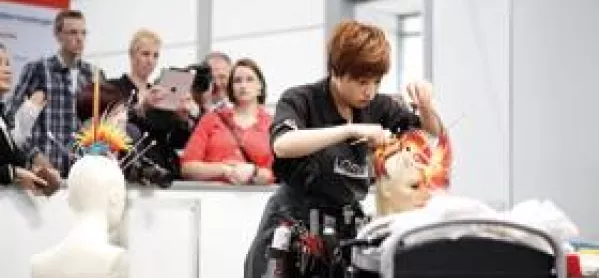Apprentices put their skills on show

Apparently the Chinese have some of the best scissors in the world, the French are experts at hair colouring and the Swiss really know their pipes and plumbing.
While it may seem a random list, these are in fact some of the tools and techniques that UK-based apprentices have been studying as part of a two- year drive to improve skills.
The National Apprenticeship Service (NAS) was inspired to send British apprentices abroad to improve their vocational expertise after witnessing the success of other countries in the WorldSkills event in London two years ago. And last weekend, their newly acquired abilities were put to the test in the latest staging of the international competition, in Leipzig, Germany.
“WorldSkills is the culmination of apprenticeship programmes from across the world,” said Jaine Bolton, director of the NAS. “People compete head- to-head to be the best in the world and from that you can learn an awful lot about your own performance. We wanted to be quite targeted about what we could learn from the best and started working with individual countries in particular skills.”
After the London event, the NAS analysed the systems in each of the countries that had performed well in various disciplines, and started doing targeted work with them. Hairdressing, for example, is a very popular vocational programme in the UK, with more than 15,800 starts in 2011-12, yet the country had never won at international level.
So the NAS organised training camps, competitions and exchanges between the UK and a number of nations to help improve techniques. It worked particularly closely with France, which is apparently world-renowned for its expertise in hair colouring, and China, which uses differently shaped scissors to give a more precise haircut.
In plumbing and heating, apprentices learned from experts in Switzerland. Bricklaying apprentices were sent to Australia to learn the latest techniques and take part in international competitions to prepare them for Leipzig.
“We are talking about a slight nudge of the skills and techniques rather than a major leap,” Ms Bolton said. “Nobody’s vocational system is standing still and the fact that our experts want to learn from others shows that our system is really strong.”
It seems the work has paid dividends: UK competitors in Leipzig took home medallions of excellence in hairdressing and plumbing and heating, as well as a gold medal in bricklaying.
Prime minister David Cameron, who has talked repeatedly of the UK being in a “global race” for skills, said the success showed that British “ambition and ingenuity” had once again taken on and beaten the best in the world.
The UK government, like many across Europe, has prioritised apprenticeships as part of efforts to tackle growing youth unemployment. Last year, the European Union urged member states to substantially increase the supply of apprenticeships and make sure that they represent real opportunities for young people to gain on-the-job training and work experience.
It is hoped that a new initiative launched during WorldSkills will help to improve apprenticeships further. The European Alliance for Apprenticeships will bring together governments, businesses, social partners and vocational education and training experts. And rather than countries such as the UK having to seek out expertise, countries with established systems will be encouraged to share ideas with less successful nations.
But some are questioning whether skills competitions are the best use of money in tough times. A spokesman for the UK’s Association of Employment and Learning Providers said: “WorldSkills competitions merit continued British involvement because we can learn from other countries. However, in the current climate, it is right that we regularly review where every pound is spent.”
Picture credit: Worldskills
Keep reading for just £1 per month
You've reached your limit of free articles this month. Subscribe for £1 per month for three months and get:
- Unlimited access to all Tes magazine content
- Exclusive subscriber-only stories
- Award-winning email newsletters



